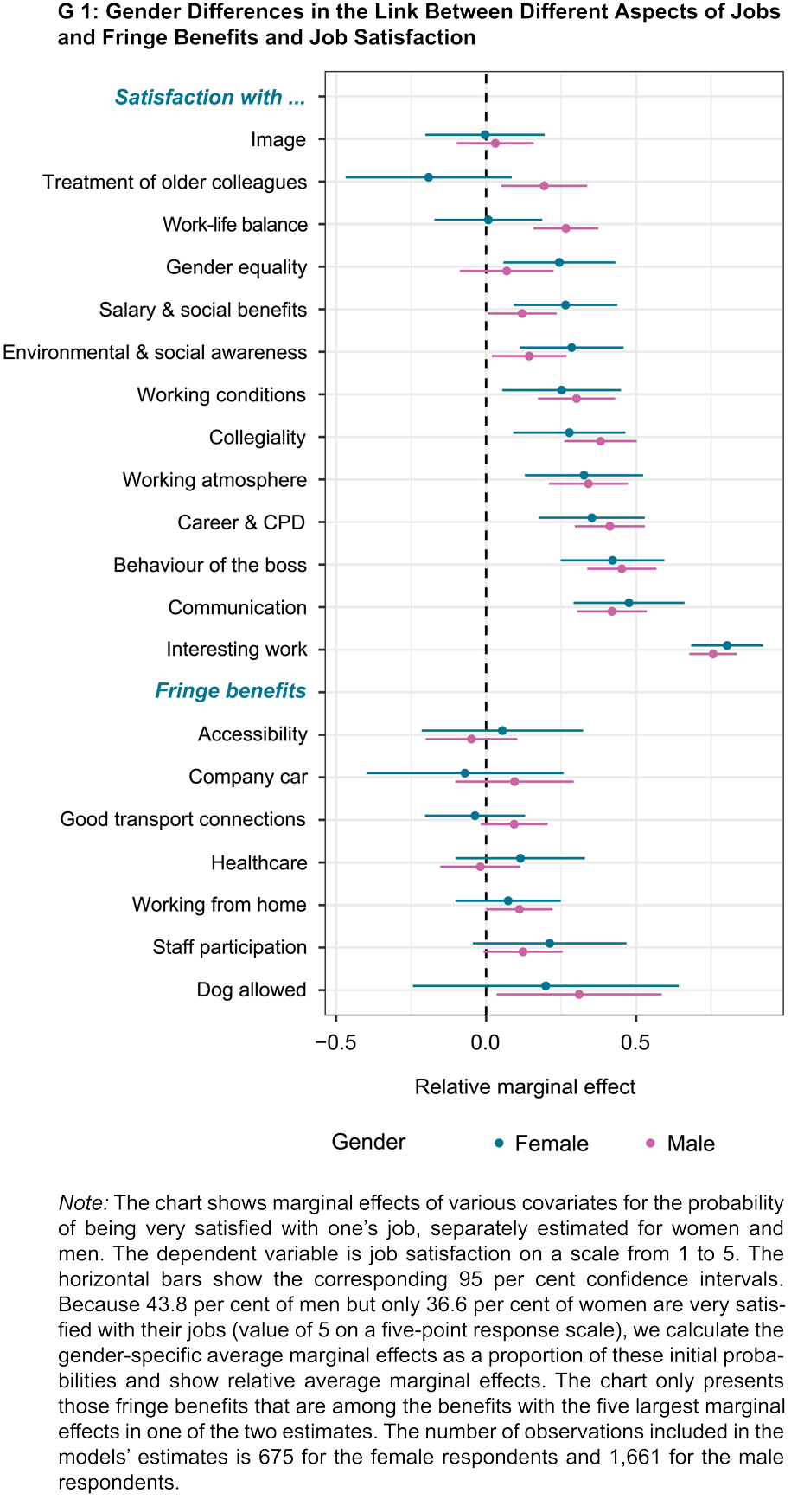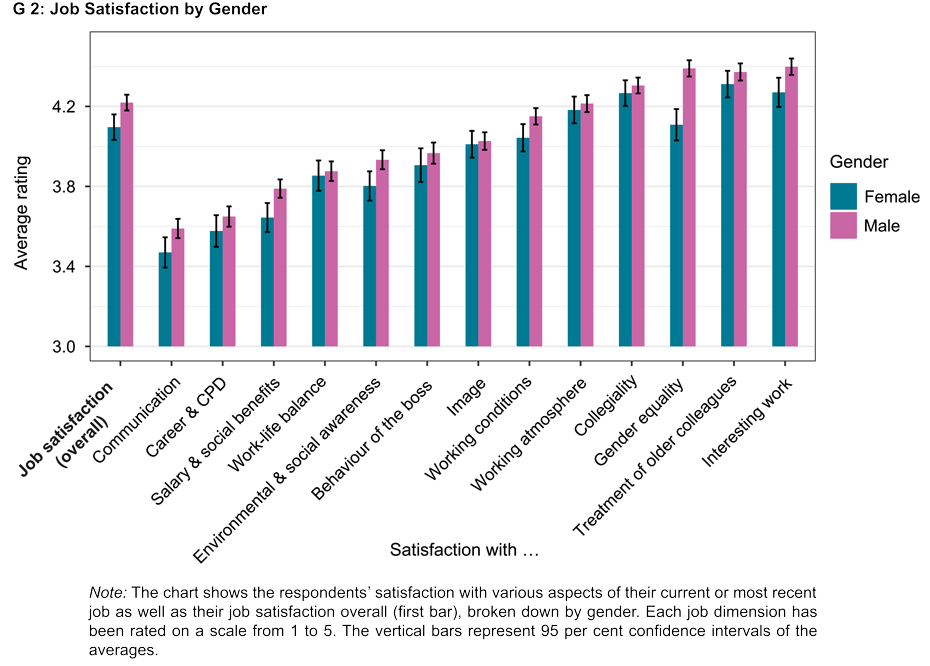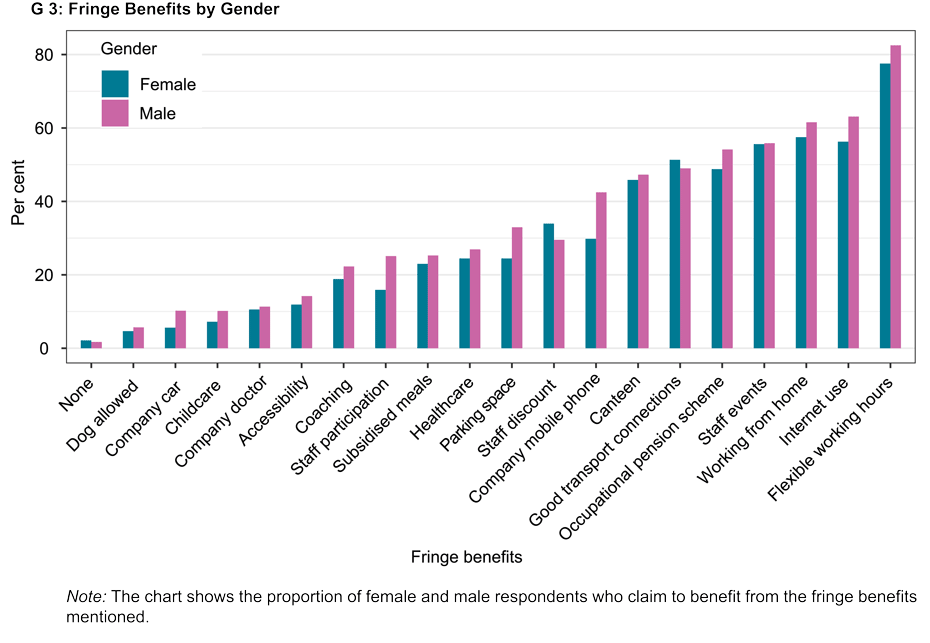Do women earn less because other job aspects are important to them?
- Labour Market
- KOF Bulletin
In Switzerland there is still a significant unexplained pay gap between women and men. It is conceivable that women accept lower salaries because they attach more importance to other factors such as pleasant working conditions. However, the latest findings from a survey of ETH Zurich alumni do not support this theory.

The pay gap between women and men in Switzerland averages CHF 1,530, as shown by the latest figures from the private sector published by the Swiss Federal Statistical Office (FSO). Men's wages are therefore 19.6 per cent higher than those of women. According to the FSO, 57 per cent of this difference can be explained by factors such as professional status, years of service or level of education. 43 per cent of the pay gap, on the other hand, cannot be explained by objective factors and, according to the federal government, indicates possible wage discrimination.
One key theory is that this unexplained pay gap is the result of different preferences between men and women: because women attach more importance to pleasant working conditions, they are more willing to forego a higher wage in return. However, a recent analysis by KOF researchers does not confirm this theory, at least not for ETH Zurich graduates. The researchers have evaluated data from a survey of around 2,600 ETH Zurich alumni conducted between November 2019 and January 2020. The vast majority of respondents work in Switzerland and have completed their studies within the last 20 years.
Unexplained pay gap of 7 per cent
There are also considerable differences in the salaries of ETH Zurich alumni. On average, the men surveyed earn significantly more – namely 16 to 17 per cent more – than the women. And here, too, part of the difference can be explained by factors such as profession, position or work experience. In the end, however, an unexplained pay gap of 7 per cent still remains.
At the same time, the researchers investigated what aspects are important to respondents when it comes to their overall job satisfaction. Is this satisfaction mainly related to monetary aspects such as wages or more to non-monetary aspects such as communication within the company?
Firstly, this revealed that non-monetary aspects are very important. Job satisfaction among alumni is most closely correlated with the question of whether they have interesting work. In second place comes good communication within the company. Also important is the behaviour of the boss, continuing professional development and career opportunities, and the workplace atmosphere. By contrast, salary and satisfaction with one’s salary are only slightly correlated with job satisfaction.
Non-monetary aspects are important for both women and men
Secondly, the researchers found no evidence that women and men differ significantly in these assessments: in terms of job satisfaction, the same aspects seem to be important to female and male respondents (see G 1). So men attach just as much importance to factors such as a pleasant working atmosphere and good communication within the company as women do. At the same time, satisfaction with pay is no less important for female respondents than for men. According to the authors, these findings appear to refute the theory that women forego higher wages because they attach more importance to other, non-monetary aspects.

There is, however, one exception here: namely the perceived equality of the sexes in the workplace. This is more strongly correlated with job satisfaction among female respondents than among men. For men’s job satisfaction, on the other hand, career and continuing professional development opportunities and – perhaps surprisingly at first glance – the work-life balance are more important. One reason for this could be that women work part-time more often and it therefore tends to be more difficult for men to organise their working hours flexibly.
Fewer fringe benefits for female respondents
The researchers also surveyed ETH Zurich alumni’s satisfaction with their jobs in general and with various aspects of them. Four out of five alumni say they are satisfied or very satisfied with their jobs. They are most satisfied with the interesting work that their jobs offer. The treatment of older colleagues within the company, gender equality and teamwork are also rated highly. However, there is fairly high dissatisfaction with communication in the workplace, career and continuing professional development opportunities, and salary.
Here, too, there are clear differences between the sexes. On average, female ETH Zurich alumni are more dissatisfied with all aspects of their jobs than male alumni (see G 2). The gap is widest when it comes to assessing gender equality within the company and satisfaction with salary.

Finally, female respondents also have less frequent access to so-called ‘fringe benefits’. As far as benefits such as a company mobile phone, flexible working hours and working from home are concerned, female ETH Zurich graduates are worse off than male graduates in almost all respects (see G 3). These differences are greatest with respect to factors such as staff shares, company cars, allocated parking spaces and company mobile phones. It is also interesting to note that almost 80 per cent of female and male respondents benefit from flexible working hours, and around 60 per cent have the opportunity to work from home. On the other hand, fewer than 10 per cent have access to company-owned childcare.
However, gender differences in working conditions and fringe benefits cannot explain the unequal treatment of women in terms of pay either.

A detailed version of this article will appear in the next KOF analyses at the end of October.
Contacts
KOF Konjunkturforschungsstelle
Leonhardstrasse 21
8092
Zürich
Switzerland
KOF Konjunkturforschungsstelle
Leonhardstrasse 21
8092
Zürich
Switzerland